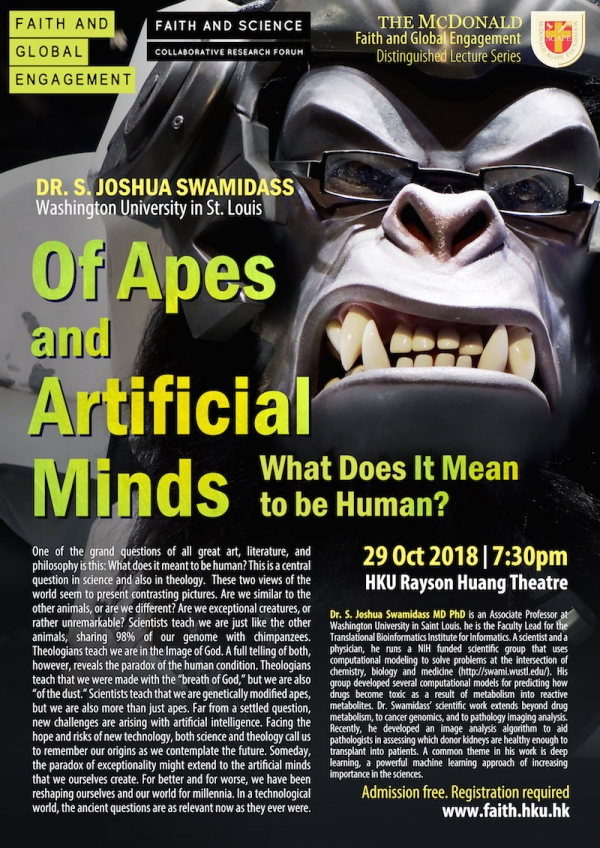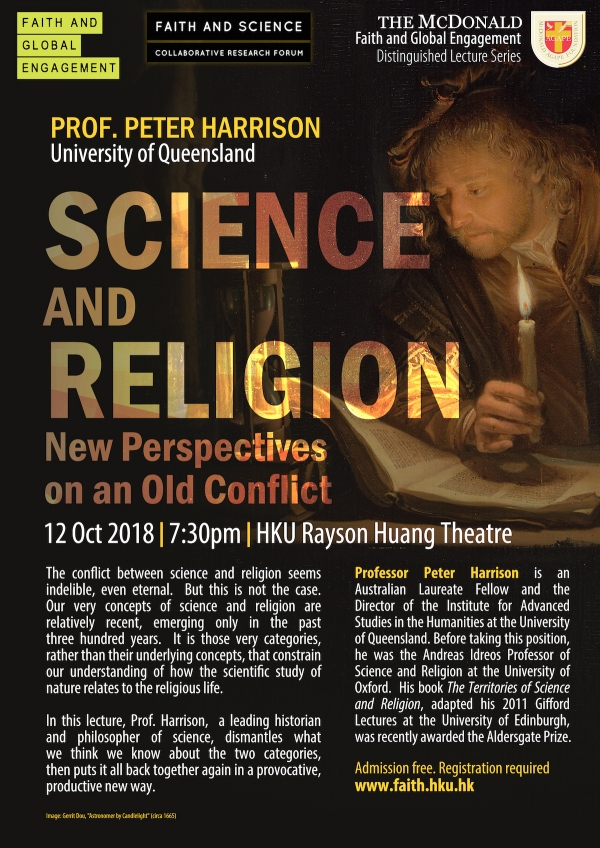|

The McDonald Faith and Global Engagement Distinguished Lecture Series
Of Apes and Artificial Minds:
What Does It Mean to be Human?
Dr. S. Joshua Swamidass (Washington University in St. Louis)
29 Oct 2018 (Monday) | 7:30-9pm
HKU Rayson Huang Theatre
One of the grand questions of all great art, literature, and philosophy is this: What does it meant to be human? This is a central question in science and also in theology. These two views of the world seem to present contrasting pictures. Are we similar to the other animals, or are we different? Are we exceptional creatures, or rather unremarkable? Scientists teach we are just like the other animals, sharing 98% of our genome with chimpanzees. Theologians teach we are in the Image of God. A full telling of both, however, reveals the paradox of the human condition. Theologians teach that we were made with the “breath of God,” but we are also “of the dust.” Scientists teach that we are genetically modified apes, but we are also more than just apes. Far from a settled question, new challenges are arising with artificial intelligence. Facing the hope and risks of new technology, both science and theology call us to remember our origins as we contemplate the future. Someday, the paradox of exceptionality might extend to the artificial minds that we ourselves create. For better and for worse, we have been reshaping ourselves and our world for millennia. In a technological world, the ancient questions are as relevant now as they ever were.
Dr. S. Joshua Swamidass MD PhD is an Associate Professor at Washington University in Saint Louis. he is the Faculty Lead for the Translational Bioinformatics Institute for Informatics. A scientist and a physician, he runs a NIH funded scientific group that uses computational modeling to solve problems at the intersection of chemistry, biology and medicine (http://swami.wustl.edu/). His group developed several computational models for predicting how drugs become toxic as a result of metabolism into reactive metabolites. Dr. Swamidass’ scientific work extends beyond drug metabolism, to cancer genomics, and to pathology imaging analysis. Recently, he developed an image analysis algorithm to aid pathologists in assessing which donor kidneys are healthy enough to transplant into patients. A common theme in his work is deep learning, a powerful machine learning approach of increasing importance in the sciences.
Admission Free. Registration required.
REGISTER

The McDonald Faith and Global Engagement Distinguished Lecture Series
Science and Religion:
New Perspective on an Old Conflict
Prof. Peter Harrison (University of Queensland)
12 Oct 2018 (Friday) | 7:30-9pm
HKU Rayson Huang Theatre
The conflict between science and religion seems indelible, even eternal. But this is not the case. Our very concepts of science and religion are relatively recent, emerging only in the past three hundred years. It is those very categories, rather than their underlying concepts, that constrain our understanding of how the scientific study of nature relates to the religious life.
In this lecture, Prof. Harrison, a leading historian and philosopher of science, dismantles what we think we know about the two categories, then puts it all back together again in a provocative, productive new way.
Professor Peter Harrison is an Australian Laureate Fellow and the Director of the Institute for Advanced Studies in the Humanities at the University of Queensland. Before taking this position, he was the Andreas Idreos Professor of Science and Religion at the University of Oxford, where he also served as Director of the Ian Ramsey Centre. He is a Fellow of the Australian Academy of the Humanities and holds a DLitt from the University of Oxford and a PhD from the University of Queensland. In 2011 he delivered the Gifford Lectures at the University of Edinburgh. These lectures were published as the book The Territories of Science and Religion(Chicago, 2015), which was named winner of the Aldersgate Prize.
Admission Free. Registration required.
|